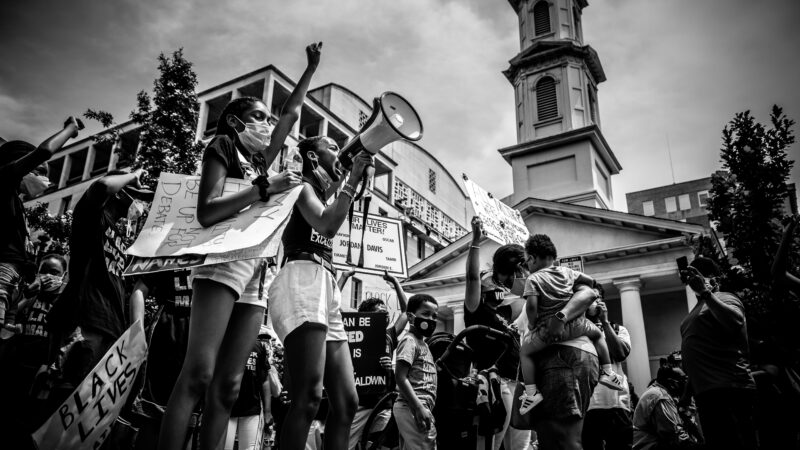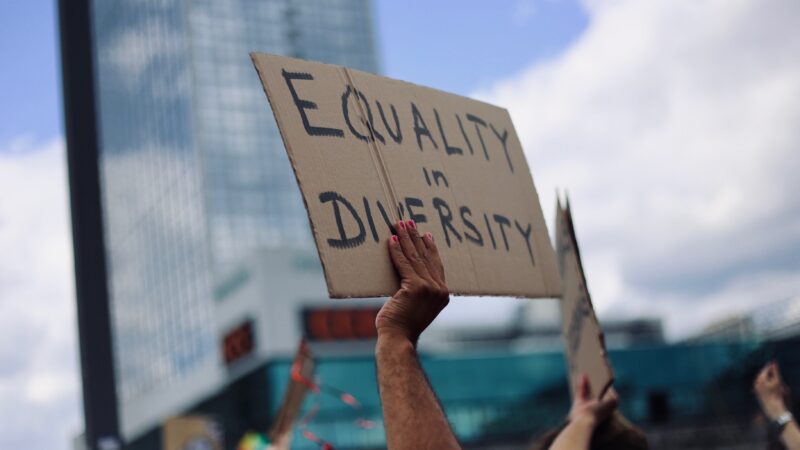In a Pandemic, Anarcho-Tyranny Reigns Supreme
Towards the end of February, the general public were graced with a brand spanking new billboard from the Merseyside Police Department. Was this new billboard highlighting the good work the police department was doing? Was it highlighting new Coronavirus guidelines? Was it alerting people to a new potential criminal threat that existed inside of the county? No. The new billboard brandished an LGBT rainbow flag and superimposed beside it lay, in large bold capital lettering, “Being Offensive is an Offence”.
To no one’s surprise, this turned out to be part of a new campaign by Merseyside Police to combat ‘hate crime’ in the area and invite people to report it to the department. This was met with outrage with many calling it out as a chilling and horrible act by the Merseyside Police; illuminating how authoritarianism, identity politics and ‘wokery’ had seeped into the uniforms of our police service. The department did retract somewhat and apologised for stating that being ‘offensive’ was a crime – which they admitted it wasn’t – but they doubled down on the need for the public to report so-called ‘hate speech’ and ‘hate crime’, all the while stressing the need to show ‘solidarity’ with the LGBT community. Truly stunning and brave.
The issue no one seems to be addressing is why on earth is Merseyside Police putting efforts into combating ‘hate crime’ when violent crime, the county’s main source of crime, has increased by 5% in the last year alone? Surely their time, money and efforts would be better spent dealing with rising violence in their county rather than unsettling the people of Merseyside with an authoritarian and inaccurate billboard? Perhaps not. After all, catching criminals is hard; controlling ordinary citizens is easy.
The efflorescence of outrage over this event provides me an opportunity to bring back into the fold one of my favourite concepts – anarcho-tyranny.
For those not aware, anarcho-tyranny is a concept which seeks to describe and explain how a state controls ordinary citizens in their behaviour but ultimately fails to enforce the protective rule of law; enabling crime and disorder to flourish while innocent citizens become ever more restricted and regulated. If you wish to learn about the origins and core examples of this concept, I recommend you read the first article I ever wrote for this publication entitled ‘Anarcho-Tyranny Reigns Supreme’. While the Merseyside Police billboard can be seen as a more traditional example of anarcho-tyranny, it enables an analysis into something more interesting, especially if one considers the context. The context that this billboard was erected in was the Coronavirus pandemic i.e. the largest national crisis that this country has faced for many years. So, while the actions of Merseyside Police may seem inappropriate considering the current climate, it does highlight two things. Firstly, that the real priorities of the state and its allied elites to control ordinary citizens remains the same; secondly, and most importantly, this pandemic has given a blank check to anarcho-tyrants whose only concern is regulation and control.
Take for example the infamous Coronavirus Act 2020. This act has facilitated a growth in the size and remit of the state that seemed impossible to most just a little over a year ago. While the British state has, in the past, taxed you, spied on you and regulated what you do with your own body, it now explicitly tells you how, when and where you are able to live your life. Except for the odd occasions when you need to go outside for shopping or exercise (or to virtuously bang your pots and pans together for our Lord and Saviour the NHS) you remain essentially under house arrest – unable to enjoy life as we normally understand it. This drastic expansion of the state into regulating every minute detail of people’s lives is a core tenant of the ‘tyranny’ part of anarcho-tyranny. As Samuel T. Francis, the originator of the term, writes, anarcho-tyranny extends and entrenches ‘the power of the state, its allies and internal elites’, so the more things that become offences – such as meeting up with others outside or going for one too many daily runs – the more power the state and its allied elites have over the citizenry. Thus the Coronavirus Act can be seen as a new zenith of British anarcho-tyranny, as it has given the state an unprecedented ability to not just regulate large aspects of an average citizen’s behaviour but effectively plan their lives. If you would like some to read some more in-depth analysis of the Coronavirus Act and its consequences for civil liberties, I’d highly recommend going through Big Brother Watch’s collection of ‘Emergency Powers & Civil Liberties Reports’ which highlight the extensive and draconian nature of the Coronavirus Act.
Another core pillar of anarcho-tyranny is that the rules only apply to the innocent and not to the ruling elites or criminals, and what has been seen during this pandemic highlights that the Coronavirus restrictions have only really applied to ordinary citizens and not to state elites and their allies. When journalists, celebrities and politicians were caught breaking lockdown rules they did not pay the same costs that ordinary citizens who broke the rules did. Many of the chief architects of these lockdowns were also caught breaking the rules and while, at worst, they had to resign their posts, it wasn’t surprising to watch government officials run to their defence. If one sees “anarcho-tyrants are the real hegemonic class in contemporary society”, as Francis did, this makes complete sense as those in power would seek to protect those that have made this pandemic such a shining example of anarcho-tyranny. The state always protects its own – especially those who enable its power.
While the anarcho-tyrants have been busy protecting their own during this pandemic, they continue to absolve the innocent of genuine protection against actual crime. While many celebrate the fall in crime overall in the nation, it is often ignored that this is not the trend for all forms of crime. On the contrary, violent crimes such as domestic abuse and homicides have risen dramatically with drug offences going through the roof also. During the first lockdown (March – June 2020) domestic abuse ended up accounting for one in five crimes during that period while drug offences climbed by 30%. The rise in drug crime is especially worrying, as lockdown has caused a litany of turf wars to break out in the country between competing drug gangs who – since being cut off from their international smugglers due to travel restrictions – have now turned to recruiting locally for dealers, smugglers and muscle; bringing ever more people into the dangerous narcotics black market. While police are busy breaking into people’s houses, arresting old ladies for protesting and shouting abuse at people simply for going for a walk, innocent people are being terrorised by violent husbands and drug gangs. As David Matthews points out, the neighbourhood drug dealer has essentially gone about his normal business during lockdown while the rest of us remain under house arrest. Currently, drug dealers are more of an essential worker than you are.
One might accuse me of sensationalism and claim, with a degree of optimism, about this all being ‘solved’ when restrictions begin to ease. But considering the last time restrictions were eased, police inevitably found themselves stuck between dealing with rapidly rising post-lockdown crime or regulating what Coronavirus rules are still in place. And if one considers the recent history of the British police, I wouldn’t advise putting any money on them dealing with the former. After all, many of the police have shown great enthusiasm in enforcing the laws of the Coronavirus Act and, in turn, have revealed themselves to be as horrible and unreasonable as some of our leftist adversaries have proclaimed them to be.
The Scottish Police stand out to me to be particularly despicable anarcho-tyrants, with one now infamous and harrowing incident standing out amongst the rest; where police officers broke into a family home and arrested those inside because there were ‘too many people’ in the house. Even though many were outraged at the event – with various civil liberties organisations running to the defence of the family – the police got off without so much as a smack on the wrists, while the adults in the family got fined for ‘abuse’ and ‘assault’. To make matters worse, this event only occurred because a fellow anarcho-tyrant, this time from amongst the ordinary population, snitched to the police despite having no grounds to or evidence that this family was breaking lockdown rules. This pandemic has not just revealed the true nature of our state, our elites and our police but the true nature of our fellow Britons also; their authoritarian streak becoming finely tuned during this pandemic.
Worse still is the Sarah Everard vigil which quickly descended into a violent mess of arrests, fighting and screaming thanks to the Metropolitan Police; with Assistant Commissioner Helen Ball giving a contemptible statement claiming that the police “absolutely did not want to be in a position where enforcement action was necessary” and that they broke up the vigil “because of the overriding need to protect people’s safety.” Large sections of the right-wing commentariat are lambasting the Met for hypocritical policing but this criticism rings on deaf ears and fundamentally misses the point. The Met engages in hypocritical policing because that is the system we currently live under – anarcho-tyranny. The police refuse to deal with genuine threats to the public like BLM pulling down statues and terrorising London for weeks on end because it is hard to control; a peaceful vigil predominately attended by young women, on the other hand, is very easy to control. It is that simple. Furthermore, the politicians and journalists crying about this event need to shut their mouths as they are the reason this tragedy was even able to happen in the first place. Politicians don’t get to simultaneously vote for continuing lockdown – which inevitably curbs our civil liberties – and then cry about the police enforcing the rules they voted for; the same goes for lockdown fanatic commentators and journalists who have helped the state construct this atmosphere where fear and hypocrisy rule. Many in these camps seem to be rapidly developing amnesia; forgetting that they are the reason all this misery, abuse of power and statism is taking place. Do not let these anarcho-tyrants forget what they supported.
Regarding the police, they remain the greatest paradox of modern Britain as they are both terrifying and pathetic. One minute they’re forcefully breaking into your house, harassing your grandparents and confiscating all of your kitchenware; the next minute they’re off to twerk in a rainbow patterned skirt in the middle of their nearest cosmopolitan hellscape. While many relish in hilarity at the current state of the British police it is no laughing matter; especially for the ordinary citizen who is the one who suffers the most under the anarcho-tyranny state. In all honesty, in their current form, the police are not our friends nor are they worthy of our support as it seems increasingly impossible that the rot of anarcho-tyranny will ever be decontaminated from the uniforms of our police. If the last year of draconianism, abuse of power, hypocrisy and out and out brutality from our police hasn’t changed your views on them even a tiny bit, then I am certain that nothing ever will. And while this may be difficult for conservatives to hear – it is ultimately true.
This pandemic has only exacerbated this rot in our country because, like during all crises, the state and its allied elites have been allowed to expand, enrich and entrench their power. Worse still, the public seem to be none the wiser about it, our media none the smarter to understand it and our politicians none the braver to address it. Woe betide what elements of Coronavirus draconianism will remain with us post-pandemic. But while this pandemic continues, one fact remains abundantly clear – anarcho-tyranny reigns supreme.










We Need a New Edward Watkin
This current period of postmodernity lacks a certain idea of permanence which our forebears once possessed. So much of what this civilisation produces, if one could still deem it such in its hyper-atomisation, is ethereal and consumable in a way that amounts to a sort of permanent revolution. Even those who still build tangible things in this society risk having no legacy. One only needs to think about all the mid-twentieth century modernist and brutalist architecture we destroy, to replace with not too dissimilar glass boxes, when considering the lifespan of today’s skylines or infrastructure.
If civilisation is to thrive once again, we could do worse than looking to a great visionary in our past as inspiration for a better future. I therefore propose Sir Edward Watkin (1819-1901) as an ideal role model for both his repeated proposals of grand projects and the almost surprising feasibility of all of them. I think it is worth first to give a historical account of him, then suggest a grand project based on his ideas.
In short, Watkin was the quintessential Victorian railway baron, yet so much more. The energy he possessed during his life was nothing short of astounding and went far beyond the railways for which he is mainly remembered today, but those achievements remain a good place to start.
From his first position in the industry as Secretary of the Trent Valley Railway in 1845 until the completion of the Great Central Main Line in 1899, Watkin’s presence was felt just about everywhere. ‘The Railway Doctor’ rescued the bankrupt Grand Trunk Railway in British North America and transformed it into the then longest railway in the world. His chairmanship of the Manchester, Sheffield and Lincolnshire Railway forged a vast network of lines across the industrial North West and North Midlands. He drove the Metropolitan Railway deep into the Middlesex countryside and beyond, ultimately creating swathes of London suburbia and a bevy of other towns. He steered the South Eastern Railway through the Panic of 1866 and further expanded it through that part of England. He became director of the Great Eastern Railway in 1868 and drove it out of bankruptcy, employing the help of fellow MP Viscount Cranbourne, later the 3rd Marquess of Salisbury and Prime Minister. He advised on railways in four continents and built the last main line in Great Britain until High Speed One over a century later. I might add that this list, however impressive it might be, is not exhaustive.
The ever-restless Watkin was not content with merely the above. Whilst saving the Grand Trunk Railway, he was enlisted by the Cabinet to take part in talks to create the Dominion of Canada. This resulted in a buyout of the Hudson’s Bay Company, which he personally negotiated after the British and colonial governments refused to do so. Elsewhere, he pioneered the first public parks in Salford and Manchester, as well as the first footpath in Britain dedicated for public use going up Mount Snowdon. Watkin developed Grimsby into the largest fishing port in the world and neighbouring Cleethorpes into a major Victorian resort. In 1894, he opened a large pleasure garden with a football pitch in a rural parish where the sheep outnumbered the people called Wembley. Readers might have heard of it. Again, this list of achievements is not exhaustive, and I am omitting most of Watkin’s political work in this article for the sake of brevity.
However, Watkin’s life and works were not without their faults, of which he is best known for two. The first was the Channel Tunnel, the only link in his envisioned railway from Manchester to Paris which was not built during his lifetime. He and his French counterpart successfully tunnelled 3.6 miles out of 22 under the English Channel before the British government forbade further work in 1882. This was the point when his contemporary critics pointed and said ‘now he really has gone mad’, but Watkin proved it was entirely possible over a century before the modern tunnel commenced digging. The site under Shakespeare Cliff and his twin tunnel design were both adopted in the 1980s. When the machine drilling the current tunnel broke into Watkin’s forcibly abandoned project, the engineers found it was dry after over a century of sitting abandoned.
The second mark against his reputation was the Metropolitan Tower, intended as London’s answer to the Eiffel Tower and the centrepiece of the aforementioned Wembley Park. The winning design from Watkin’s competition was to be 1,200 feet tall, 150 feet taller than the Eiffel Tower at the time, and the tallest structure in the world until the completion of the Empire State Building in 1931. If it had been completed, it would still be the tallest building in the United Kingdom today. Unfortunately, this would-be monument to heroic materialism was scuppered by a lack of willingness from investors to fund such an extravagant speculation. The first stage was finished in 1895 at a height of 154 feet, but a redesign several years prior to cut costs had already sealed its fate. Only four of the planned eight legs of the tower were built, putting too much pressure on the ground and leading to subsidence. Watkin’s Folly, as it had become known, met its fate via dynamite in 1907. Wembley Stadium now stands on the site, with its arch rising to 436 feet to serve as the constant advertisement Watkin had once hoped for his tower.
It is safe to say that if Watkin were on the parts of Twitter frequented by many readers of this publication today, he would be regarded as a radical Anglofuturist. His manifold ambitions demonstrate an absolute faith in the United Kingdom and its future at the forefront of global civilisation. With knowledge of some of his ideas, energy and determination, one can now imagine a grandiose yet entirely feasible project to strike a course away from national stagnation and decline.
We shall call it the Great Central Railway Company, a fitting revival of a name for what one can foresee as the backbone of a coherent and comprehensive railway system for modern Britain. This cannot be a state venture as most modern railway projects have become, subject as they are to hordes of overpaid bureaucrats and special interests. The GCRC would be a private company naturally responsible for every part of its operations and with the logical aim of out-competing Grant Shapps’s reheated British Rail in every way.
It would first be useful to lay out the technical and aesthetic quirks of this company’s core railways. China has been extremely industrious in its construction of very high-speed lines over the past decade or so, thus Britain can and should do the same. Our trains would be the old British-made InterCity stock on steroids, which one shall call the InterCity 325, with a top speed of 325kmh. It might be pandering, but perhaps we should also incorporate some ideas from the Mallard steam locomotive in these trains; it relates nicely that the refurbishment program for the InterCity 225 carriages was called Project Mallard. Aside from being a rather nice shade of blue, its curved front still maintains a surprisingly modern appearance despite it being over 80 years old.
Infrastructurally, this company would not mess around with glass boxes or minor ventures. GCRC main lines would have four tracks as a minimum to separate the local and freight trains from express services. Stations would be of a two-platform island design, plus as many more platforms as needed for express and branch line services. Smaller stations would be built with a dignified but cosy atmosphere in mind, whilst the larger stations would be designed akin to a palace for the people as the Great Central Railway’s Nottingham Victoria once was. I am quite sure this would actually turn out to be cheaper and more visually appealing than doing something artsy with glass and/or steel for the millionth time.
Now for some actual railway lines, of which I shall discuss two focussed around tunnels once thought of by Watkin. We shall start with what could be called the New Eastern Main Line at Dungeness, which Watkin once wanted to turn into a resort town like Cleethorpes, and strike northwest by ‘borrowing’ a rather straight freight line across the Romney Marsh. We shall carry on until Tenterden, whence it would curve slightly to brush by the east of Headcorn and then go on to Maidstone. There would have to be some urban negotiation by viaduct, as there would be in the Medway conurbation, before emerging into the open countryside of northern Kent around Wainscott. It would then move north, go under the Thames to Canvey Island, and begin its whistlestop tour of eastern English towns. It would travel past Benfleet, Hadleigh and Rayleigh (with interchange for London), then Woodham Ferrers, Chelmsford and Great Dunmow before reaching Stansted Airport to its east. Onwards it would go to Royston, Godmanchester and Huntingdon, then Peterborough (with a complete rebuild of its station) before reaching Spalding. In Lincolnshire, it would follow several mostly abandoned lines to Boston, Louth and Grimsby before ‘borrowing’ a couple more lines to reach a tunnel under the Humber at New Holland. We shall stop discussing this line in detail with Hull, with it having achieved Watkin’s plan of connecting Hull with the south, but from there it could easily go deeper into Yorkshire and beyond.
The other line I shall discuss will be the Great Central Main Line, but with a route beyond Watkin’s achievements which shifts this project from being defined by a semi-romanticised past for the sake of the present to defining the very future of this Kingdom. I think a new terminus next door to the original Marylebone but larger is fitting, then ‘borrowing’ the London to Aylesbury line from its current custodians. It would then follow the old railway up through Rugby, Leicester, Loughborough, Nottingham, Sheffield and finally Manchester via the Woodhead Tunnels, but from there we must go further north. It would make its way through Salford and Bolton before reaching Blackburn and Preston. Then it would go in a straight a line as practical near the M6 to Lancaster, Kendal, Penrith and Carlisle before reaching the Scottish border at Gretna. The next leg of this line would see a rather straightforward journey through southwest Scotland, the only towns of note on the way being Dumfries and Newton Stewart. However, at Stranraer we must irrevocably change the political and economic trajectory of the British Isles with a tunnel under the Irish Sea to Larne and ultimately Belfast. There may be a large munitions dump in Beaufort’s Dyke which would merit some praying during construction, but the benefits of joining the two main islands of the United Kingdom, even those which are merely symbolic, cannot be understated.
One could envision the natural evolution of dozens of branch lines serving further towns and cities from just these two lines alone. Indeed, the entire national infrastructure network could reorient itself with just a handful of main lines inspired by Watkin’s vision, prompting a new era of construction which merges the functionality of technology with our primordial desire towards the beautiful. These railway lines would also give many counties much-needed economic relevance through the secondary emphasis on freight, a far more prevalent aim of the railways from Victorian times until Beeching, giving eastern counties in particular the opportunity to have purposes other than being London’s barracks or middle-of-nowheres.
All that is needed is the money and willpower to see this project through. With a new Watkin in our midst, I am sure that we can once again find the willpower, wherefrom the money would follow, to reassert our faith in this country by building something remarkable. I hope readers agree.
Photo Credit.